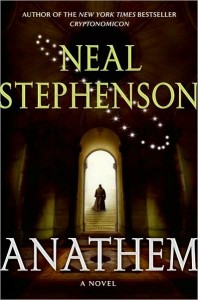Yeah, I know I’m probably late to the party on this one. I haven’t finished the book yet, and if I knew just a little less, I might find it very convincing. As it is, I am left with significant doubts.
Simply put, there are basic factual errors and what I think are meant to be simplifications or glosses on complex topics that are so gross as to misrepresent things, in subjects about which I know a fair amount, which lead me to be suspicious of everything else in the book–because why would he just play fast-and-loose-and-ignorant with the stuff I happen to be familiar with.
In the realm of basic factual errors, when discussing Eric Schmidt (P. 67), he says, “He ran Novell, one of Silicon Valley’s most important software firms”.
That must come as a great surprise to Novell, that had its roots in Provo, Utah, and, looking on novell.com, appears to this day to not have offices in Silicon Valley (though, interestingly, corporate HQ is now in Waltham, MA).
This tells me that 1) he didn’t do basic fact checking himself, and 2) he never showed that piece of text to anyone who knew even the most basic things about Novell.
In the realm of simplifications or glosses that are so gross as to distort reality, well, let’s talk about Bill Joy.
First, I acknowledge that Bill Joy has huge expertise in software development, contributed many important things to UNIX, and was working deep in its internals during a time when it was rapidly gaining features.
But “by the time he happened to be presented with the opportunity to rewrite UNIX, he was up to the task” (P. 46)? I have to question this. Bill Joy was part of a group of grad students at Berkeley who modified and extended the base Unix distribution from AT&T. He was a DARPA employee tasked with running the group that added TCP/IP to the Berkeley kernel. He was a founder of Sun Microsystems. But he didn’t, as the text implies, single-handedly rewrite UNIX.
Or,
bq. It was so good, in fact, that it became–and remains–the operation system on which literally millions of computers around the world run. “If you put your Mac in that funny mode where you can see the code,” Joy says, “I see things that I remember typing in twenty-five years ago.” And do you know who wrote much of the software that allows you to access the Internet? Bill Joy.
To quote from Wikipedia, on “Mac OS X”:http://en.wikipedia.org/wiki/Mac_OS_X, “Mac OS X is based upon the Mach kernel. Certain parts from FreeBSD’s and NetBSD’s implementation of Unix were incorporated in Nextstep, the core of Mac OS X.”
Now it’s true that FreeBSD and NetBSD are both descendents of the BSD releases that Bill Joy helped create, package and distribute. But that path is tangled and tortured, and much of the original code has been rewritten over time by others, so, to imply that millions of computers around the world are running this operating system Bill Joy ostensibly wrote is ridiculous.
And the software that allows you to access the Internet being Bill Joy’s creation? Um, no. This is not to say that the implementation of TCP/IP in BSD UNIX was not important, or that the BSD Sockets interface is not worthy of mention. But the fact is, over time, all of that actual code has been replaced, just as Bill Joy scooped out chunks of what came before him and replaced them.
Again, none of these things are outright falsehoods, but they are such enormous missrepresentations of the true state of things, that I am left wondering how much stuff he distorted in his discussions of hockey, about which I know nothing.



